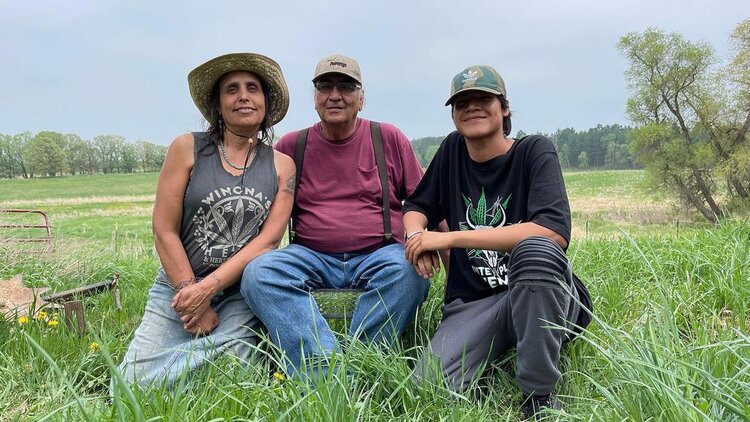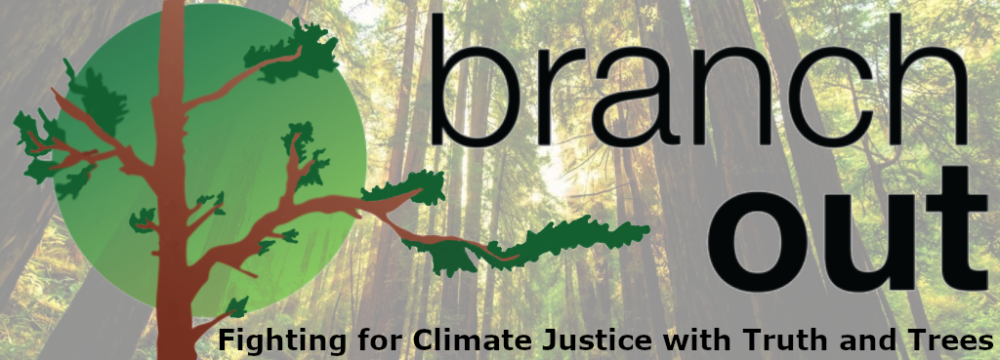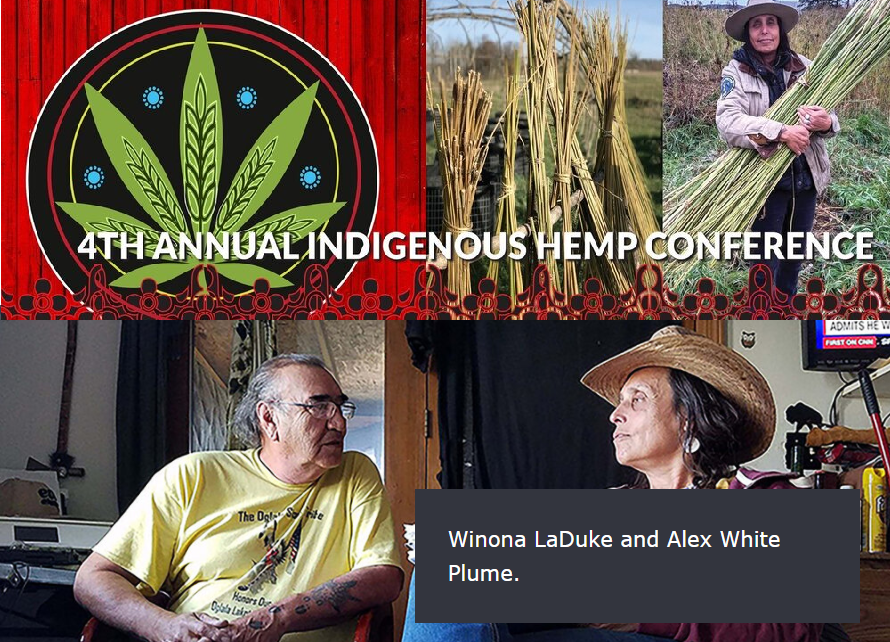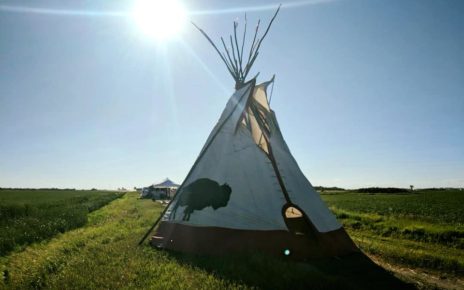On March 5th, 2021, the Anishinaabe Agriculture Institute sponsored the 4th Annual Indigenous Hemp Conference. The theme of the conference was Giigikendamowin Bagami-ayaa Wiinibwaakaawin, “Let the Knowledge of Our Past Become the Wisdom of Our Future.” This article is the first of a series of transcriptions composed by Branch Out of the videos of the 4th Annual Indigenous Hemp Conference, which can be found on their YouTube channel here.
Winona LaDuke: Aaniin nindinawemaaganidog. Hello my relatives. Thanks so much for joining us this year for our fourth Indigenous Hemp Conference. We’re really really proud of this, it’s been an interesting time for all of us. You know, I keep looking at this moment in time…
Oh, by the way I’m Winona LaDuke – I’m director of Anishinaabe Agriculture and Winona’s Hemp. And I’m one of the mothers of the conference, and I just want to thank y’all for coming out.
Because in this time, you know, we have spent this time in this tremendous change, I think of it as Arundhati Roy talks about – Pandemic as Portal – this moment when everything shifted in the world. None of us knew that was going to happen, and now we have this opportunity to make this greater change, this transition to a better place, a better world. We’re going to walk through that portal between one world and the next, to something that is far more beautiful. Well making that – is us. That’s how change is made.
In this new green revolution… hemp’s going to change the world, and it is changing the world.
And a lot of it is going to be in this new green revolution. You know, that’s what we call this here, the hemp. Because hemp’s going to change the world, and it is changing the world. And so I’m really grateful that y’all came together this time. And we’re going to start by – I ask my kola [friend] Alex White Plume to start up our conference, because Alex White Plume is the guy that inspired me to do all this hemp. And he is indeed the Hemperor, a teacher for all of us, a great spiritual and political leader, and the beginning of the renaissance of Indigenous hemp is really to be attributed to my great kola Alex White Plume. So we’re really grateful you chose to join us today Alex, from Manderson?
Alex White Plume: Thank you Winona, it sure is an honor to share a computer with you this morning. Before we get started I’d just like to say a word of thanks. Today’s a beautiful day. This time of year the Earth turns blue – called tȟó – that blue is the beginning of turning green. And I can look out to the land, and I can see the sightings a little bit blue on the Earth. So I know spring is coming, and that it’s almost time to put the seeds in the ground.
In Lakota we call hemp wahupta ska pejuta – the white root medicine. And I got a lot of roots sitting around, and I’m starting to share with people.
The same old same old has to go, and I want to encourage you to be brave, have courage, to get those hemp seeds, and put it in the ground.
And I want to encourage everybody that’s here, and everyone that’s getting ready for summer: it’s time to change. The same old same old has to go, and I want to encourage you to be brave, have courage, to get those hemp seeds, and put it in the ground. Many of us have been standing here doing that for many years, and all these years we went through hardships, but today, hemp has been legalized all over the country. And so we have to start getting to a point where you treat it like corn. Where there’s no big deal.
Many tribes are legalizing industrial hemp, or wahupta ska pejuta, and over-regulating a non-narcotic plant. And so this is the issue that we face today. And this year, I have a surprise for people. My original seeds I started with in 2000, I sent them and I had them bred, and I’ve been planting and saving my seeds. And today, I have a little over a thousand pounds of hemp seed of my original plant, that I want to share across Indian Country. Because they’re 0 THC, and have high CBD content, as well as other good products. So I want to share that – this year, I’m planning on doing that.
The tribal regulations – we’re trying to use some of them, but not all of them. So the tribal council, we want to go to them and make some adjustments – to the hemp plan, they call it. And we’ve got to make it so that it’s real simple and easy, and we have to buy from each other. I’d like to get to a point where we all trade and sell to each other, and that we all create these different uses for hemp.
And some real intricate designs my sisters were working on, and I like it. They could use the hemp fibers and dye ‘em and braid ‘em together and weave ‘em in such a way where you can put a few beads in there and we can share our wares, we can look so beautiful when we look Lakota, when we dress up in our regalia. And so I just want to encourage everybody out there: today’s going to be a good day, we’re going to learn a lot, there’s going to be a lot of new minds that came in.
I remember a time when no-one was doing hemp, just a few of us. And somebody created the first hemp potato chip, it was from the southwest, it was blue. And everybody went “ahhhh.” And somebody created a new soap, and everybody went “ahhh.” Today, all these new uses are just coming to be, and it’s just wonderful that we could continue, creating new uses for ways to use this beautiful plant and to share this. And everybody’s fee patenting everything in the white man’s world. I don’t know how to do that and I don’t believe in that. I think this plant was here for us to all share and use together.
So with that, wopila [thank you].Winona, it’s such an honor to be here today with your conference, and it’s going to be leela washtay [a good day]!
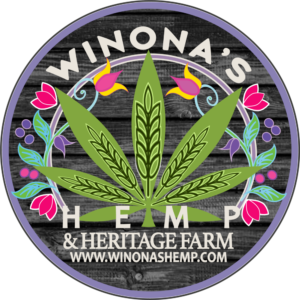
Winona: Miigwech [Thank you]. Miigwech for starting us off, kola. Now don’t leave me, because I think we got some more questions for you, you know, to just kind of ask you. And so, here we are. I’ve been growing hemp for five years at Winona’s hemp, but I was inspired by going out to the pony races and seeing Alex with the first hemp house, and then Alex’s family was all subject to the legal, the state, and the federal agencies. You were banned from growing hemp, weren’t you Alex?
Alex: Yeah, I was the only family in the world that had a restraining order, a lifetime restraining order never to grow hemp *chuckles*. I’d like to make an announcement. Winona’s the first Indigenous woman to use a hemp rake to break the stalks and the fibers down in the United States. So you have that honor, of being the first Indigenous woman to break hemp using the original Thomas Jefferson hemp rake. And my hemp rake had some of the hemp twines still stuck in it from 200 years ago. So it’s an honor to see you do that, and you have that title Winona.
The fact is that, if you want to change the world, you should find some good pals and change it together. Because you can’t do it all on your own.
Winona: *laughs* Thank you! There’s a lot of work from that to making all the canvas we plan to make, you know? And I think that what we’ve noticed is that over the past years, more and more tribes have been interested in hemp, but there’s all this predatory stuff that’s going on. And that’s part of why we have this conference, to open it up. Because I like what Philip Whiteman said, he said: “the next economy is about cooperation, not about competition.” And the fact is that, if you want to change the world, you should find some good pals and change it together. Because you can’t do it all on your own.
But as we see out there, there’s this emergence of so many Indigenous Nations that are interested in hemp, for so many obvious reasons. First of all, all that stuff we could make out of it. I’m mostly interested in textiles, you know, because the word canvas comes from cannabis. That seems like a pretty fundamental part, so much of our economies. And a lot of our tribes have been growing hemp for many years. In fact, in your nation – isn’t it a part of the ‘68 treaty, the right to continue cultivation?
Alex: Yeah, our treaty states that we create our own fiber – food and fiber – so that’s actually interjected into our treaty. And our tribe passed the original law in 1998, and our THC level was at 1%. So when they were making this new law, when Trump approved it, the Tribe depended on three lawyers that had nothing to do with marijuana or hemp. So they lowered it down to .3% which is the American level. And now, the USDA just recently passed their rules, and they went up to 1% – what the Tribe originally had.
So now we’re trying to get our Tribe to shift again, and most of our Tribal Councils are modern day legislators, they call them. They’re not leaders, they’re legislators, they’re representatives and they don’t really know the situation, the deep inner situation with the cannabis world so they just have these lawyers that are from the outside come in, and they write some legislation for them and they all just jump on the bandwagon and approve it. So it’s really kind of scary and dangerous at times. I have to meet their rules, and so it took me twenty years to get to the point where I finally could grow hemp.
And they said it was illegal, but when the Oglala Sioux Tribe is under a bill in congress, but under the Oglala Sioux Tribe we have a treaty that was signed by the United States, it’s a living document that’s real, it has never been rescinded. So we went under the treaty rule, and I think today, all Nations across the reservations, we shouldn’t use that word Tribe. If you look in the dictionary for the word tribe, it means a pack of wild dogs. So if I have to be a Tribe, I always claim to be a Rottweiler, you know.
Let’s stand together in sovereignty with this seed, and let’s represent our stories together. The two-legged, the hemp seed – the wahupta ska pejuta.
But we have to symbolize sovereignty and stand with this seed in a sovereign matter, and let this seed grow. But they were almost wiped out like our buffaloes were almost wiped out. They were almost wiped out like the wolves were nearly wiped out. They almost wiped us people out, the Indigenous people out. The seed represents the same plight that we have today. And so we all have to join, cooperate together, and stand in solidarity. Not unity, we’ll never have unity because we have too many differences amongst the Nations and so, I want to encourage everybody: stand in sovereignty. Let’s stand together in sovereignty with this seed, and let’s represent our stories together. The two-legged, the hemp seed – the wahupta ska pejuta.
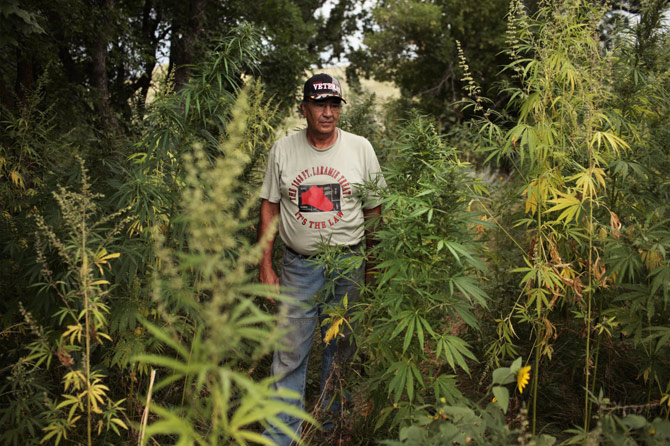
The Sioux – it’s the strongest symbol, the Sioux is the seed. And without seed, nothing would grow. We won’t grow, the tree won’t grow. Nothing starts from root, we all start from a seed. So we have to cherish the seed, and treat it reverently and respect it, and good things will come from that, that we act in this manner.
Winona: Thanks for telling us that and reminding us that. Because, I learned a lot – I’m pretty good at corn, bean, squash, potatoes. And I never grew cannabis all those years, and I just started growing, and you had to learn how to grow it. And one of the things I’ve been noticing is there’s a big push to make a lot of money off of the plant. And I don’t think a plant is a slave – a plant’s not a slave.
And I think that what’s happened – both with the USDA and on the other hand with the legalization of cannabis. Like I’m 100% for legalization – and I also want to have good intent. So what I know is that the plant is a medicine, and I also know that the plant has this ability to change the world. To change the world. And so if you want to partner up with a plant to change the world, it’s really time to learn about the plant, not tell the plant what to do.
Because the plant’s been criminalized – criminalize a plant! You know, in North America after so much valuable use. And so reconstructing the industry – well we started Winona’s Hemp, we’re going to talk about that later, but – I went to see you, I saw your cool hemp decortication, the stuff that we started with.
You know, we start with that and then everybody’s like, “Oh, do this, you’ll make a million bucks. Do this, plant these guys, get this big piece of equipment, get these things, get these things.”
People say, “I wanna grow cannabis,” I say, “Do you grow food?” Good idea: Grow food, and grow cannabis.
One is: we need to be solid on what we’re doing, and who we are. And remember our relationship to plant. That’s what I think is super important. Because when I started growing the plant, I heard all that stuff but that’s like a lot of smoke and mirrors. The question is: what’s the plant, how does it grow where you live?
You know, people say, “I wanna grow cannabis,” I say, “Do you grow food?” Good idea: Grow food, and grow cannabis. You know what I’m saying? It’s: if you can grow hemp, you can grow tomatoes, you can grow potatoes! So I think it’s part of this renaissance.
But also, watch how the plant grows! I didn’t know things, like I understood that the girls have the flowers and you gotta keep the boys away. But a hemp field is all full of girls and boys and they’re all having sex and they’re all having a really good time. And at the end, you have a hemp field that’s full of fiber.
And your fields were so happy, I remember when they banned you, but your fields grew back anyway, huh? The seeds come back. So what do we learn from what the plant’s like, why they come back? You know, why do they come back, what did we learn, how do we build up the strong seeds? A lot of our seeds like you’re talking about, there’s all kinds of feral seeds, because when it was criminalized, those guys went and hid by the riverbanks. So there’s all kinds of seeds out there, those are tough dudes. Right?
And those are the ones I think that we can start bringing back but with reference, and with respect. Instead of telling the plant, “you’re going to make me a million bucks,” say, “let’s work on this together, change the world, my friends.” Our relatives, you know?
The seeds don’t belong to the federal government. The seeds belong to Mother Earth. And how we as Nations begin to exercise our jurisdiction – this is going to be an interesting path ahead.
I think it’s such an interesting time and your leadership has been so key to this – strong, spiritual. And the other thing you’re saying that I think is super important is the idea – tribal governments get all twirled like this (*performs twirling gesture*) – that’s my impersonation of tribal governments – without federal regulations, right? And then the Trump administration was even worse. And being strong for our seeds, this is sovereignty. The seeds don’t belong to the federal government. The seeds belong to Mother Earth. And how we as Nations begin to exercise our jurisdiction – this is going to be an interesting path ahead.
Alex: Yeah, right. I think for a while there people were jumping on the bandwagon to make a million dollars overnight, become instant millionaires. And they weren’t worried about the seed, they weren’t worried about the soil, they weren’t worried about where to get the water. I think a person should plan on what he wants to do, and then address the amount of seeds he wants to plant to support his own little self.
This year – I’ve been growing CBD for 20 years – and about 99 percent of the hemp market today is CBD. So I’m stepping aside this year. and I’ma grow a little bit of CBD, but I’m gonna grow my seeds to create some cooking oil this year. And I think cooking oil will be a real popular topic, so I’ma have seeds to press that, and I might borrow your seed press you got up there. That’s my adjustment, and I want to grow as much acreage that it’ll take for me to take cooking oil for people, as the demand is there.
So I’m not going to overdo it. I know a lot of people in Colorado – there’s thousands of acres of hemp still standing in the field ‘cause nobody bought it. Because they just wanted to – boom! – thought they were going to get instant millionaire. But you have to develop a personal use plan, and plant as much seed that will take you to create your own business and become successful in your own self, and not depend on money that’s gonna come freely out there. ‘Cause money’s hard to get nowadays.
Winona: You know, the other thing is, I feel like this conference, we’re hoping to actually encourage hemp seed societies. You know, because seeds are best taken care of by the people who love the plants. And that is not necessarily a tribal DEA officer or a tribal resource officer, but those of us who are the friends of the plants. This is our opportunity to share some of these ideas and to learn together, because as this industry developed – it was criminalized in this country, as you well know, Alex – and when it was criminalized, all of the technology for – you know, Minnesota had eleven hemp mills. How do you build those, where’s those parts? They disappeared. All of the equipment was buried, and it was criminalized. So it’s like a forensic mystery that we’re reconstructing.
And you’ve had friends in Europe that have come over, I mean you got a lot of your friends from Europe, our old relations, all our relations of building solidarity. So now I’m interested – I’m seeing this technology that’s being transferred from other places. I see western, eastern Europe and Turkey, like a lot of places are doing this. It’s super interesting, this moment. So what we want to do is really create this learning process for Tribal hemp growers, cannabis growers, so that together, we can learn. And what I know, I share with you – because if I’m gonna change the world. If I make it – figure out how to grow hemp and put it in the mill to turn it into something like this fabulous hemp jacket I have on – see my hemp jacket? – I need a lot of fabric. I can make one jacket myself with my fabulous field, but if you want to be a revolutionary – the new green revolution – you need a lot of Lakotas to grow some hemp, build this industry, and power those mills off of wind. You guys got this, you’re the new green revolution right out there.
I want all the nations to grow this hemp, create an economy, make some money so we can hire some lawyers to get America to honor the treaties. And I think if we all jointly do this together, we’ll make an impact.
Alex: Exactly. I want all the nations to grow this hemp, create an economy, make some money so we can hire some lawyers to get America to honor the treaties. And I think if we all jointly do this together, we’ll make an impact. Cause the Oglalas, we’ve been fighting for treaty since day one. Since 1890. That’s when the Chief Red Cloud started the Black Hill Sioux Nation Treaty Council. But we were alone, so we didn’t really make an impact. And today, you look across America – we don’t make a financial impact, we don’t make an economic impact, we don’t make a voting block impact. But if we all come jointly together, I think we can make an impact so strong that they will have to listen to us.
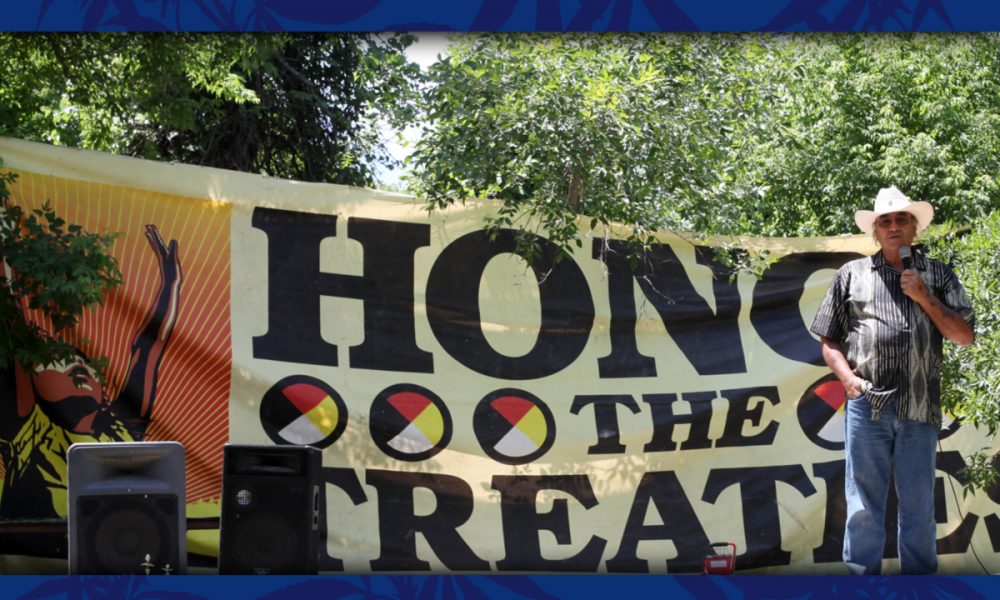
Because I think America has so much racism, they need to address that. And it’s not really racism, it’s hatred towards us because they’re living on land, blood was spilled, and with that blood that was spilled it’s causing them to feel ill. They’re not really happy, they’re not really normal. Capitalization I guess is really not a good way.
So I just want to encourage all the Nations listening today, let’s all grow this together, let’s all stand together with this plant, let it bring us together and with that we can resolve the unresolved grief and the treaty violations that still exist in this country.
In our prophecies we talk about the time of the seventh fire, and this change – we have a choice between a scorched path – well worn – and a green path.
Winona: Yeah, thanks for saying that Alex, and I think that that is part of what this just transition is. And to me, more than anything – this hemp represents this opportunity in this just transition.
In our prophecies we talk about the time of the seventh fire, and this change – we have a choice between a scorched path – well worn – and a green path. There’s no time like the present to see the clarity of that moment. And if anything is the green path, it is this hemp path that can do anything that fossil fuels can do.
I mean, I’ve heard it said that a hundred years ago we had a choice between a carbohydrate economy and a hydrocarbon economy. And the carbohydrate economy was, of course, hemp. And Henry Ford made a car out of hemp, fueled on hemp.
But you know, the fossil fuels interest took over. And we all told those guys to leave that stuff in the ground, that’s what you’re supposed to do. But here, they got it out of the ground, now we got to figure out how to get that back in, and then also hemp has this ability to sequester carbon. Because it grows so fast it sucks all that carbon in, and has this ability to bioremediate.
Hemp has this potential to address climate change, it has this potential to address a massive transformation of agriculture from crazy agriculture to local agriculture where we make stuff that we actually use in this country.
Magical, magical plant. With this scale, you know, faster than growing a forest to sequester carbon, you grow hemp. That’s what you gotta do. And then you make hempcrete houses out of it to reduce the CO2 impact of all of that concrete, which is like the third largest source of CO2 emissions in the world: concrete. You know, if it was a country it’d be the third largest source.
So hemp has this potential to address climate change, it has this potential to address a massive transformation of agriculture from crazy agriculture to local agriculture where we make stuff that we actually use in this country – like maybe canvas. Or maybe offset textiles, because right now we’re using like 50 million pounds of fossil fuels in our textiles. Like all that nylon and stuff. But we need to go back to linen and hemp, because that’s like the answers, you know it’s like a way better plan. So it has this opportunity to transition to a post-petroleum textile economy, a post-petroleum building economy, and also has this potential for our Tribes to be at the table, not on the menu.
That’s what I see. But that takes us knowing what we’re doing, having a good assessment of technology. Not like, ooh yeah we’ll do that one. You know, how many times – my own Tribe – have I seen consultants come in, “make you a million bucks,” oh yeah, and then not – little shrub high plants. I was like, “no that doesn’t look like a million bucks to me.” How about we start with respect, instead of a million bucks, and then we’ll be at the table soon enough. But we’ll be at the table because we got this.
So I just want to thank you again for your leadership on this, because without you, a bunch of us wouldn’t have had the courage to keep following up. You know, hemp arrived but you’re the one who kicked the door open for Native people.
We can use this industrial hemp to create an economy, we can create our own ways where we don’t have to depend on the Feds no more.
Alex: Well thank you, Winona. I think the Nations need to get together and deal with these Tribal councils. They’re kind of like – they’re colonized, they’re real colonized. They won’t do nothing, they won’t buck the hand that feeds them, they say. But we can use this industrial hemp to create an economy, we can create our own ways where we don’t have to depend on the Feds no more. And I think that should be the guiding principle of all of us that’s starting this new economy.
Because in twenty years, I think hemp’s going to dominate everything. The 3D printers where they’re making computers, replacing everything that’s plastic – in California they’ve been experimenting with that, and hemp is a sheer contender to being used in all fashions of modern day uses, not just the old ways. And we’ve got to always consider that there’s a new future, it can’t be just the way it is today.
So today I think hemp is – I’m not going to give up on it. When I first started hemp, I had a thriving buffalo ranch, I raised paint horses, I had a good full life. And all the twenty years of struggle with this hemp – I lost everything. So I’m going to work until I get my ranch back up, my buffalo herd back up, my horses – my beautiful paints – again, and then I’m going to step aside. By then I hope our grandchildren will have the courage and the forethought and the strength to continue on what you and I have started, Winona.
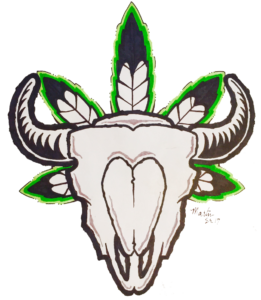
Winona: Yeah, thank you. I just want to say that our grandchildren are our retirement plan. That’s mine. And it took a little while, because we’ve been working really hard, but you’ll have your Buffalo herd back, you’re going to feed them your little hemp pellet nuggets, or whatever – you was giving them all the best goods, right? And that’ll be a good lesson, and there’s hemp feed, now they’re approving it for chickens or whatever. And I was like – we all knew that was a good idea, anyway.
And that’s the thing about our Nations, is that we should exercise jurisdiction over our plants, not wait til the USDA says, “hey, you can feed some chickens some hemp.” You know? We knew that.
I mean, all of these things – that’s why it’s so important what our first nations, what our Nations do with hemp, because we need to provide the leadership. The federal government – when did we think the federal government would provide leadership? Was there any point?
No, we never thought the federal government would provide leadership so let’s be who we are. And then – our Tribal governments, as you said, are enmeshed in these federal appropriations, and the feds are breathing down their throat, and plus you got COVID – it’s CRISES everywhere.
It has been for a long time, but that’s why you need committed farmers – like yourselves, like myself, and the many who are attending this conference. To be able to come in and say – you know, we are committed to the plants, and we’re going to help develop our nation’s legislative and regulatory systems to protect our seeds and to build these economies. Because this belongs to us, as much as we belong to our Mother Earth and our plants, this is this new economy that is totally – like when I always look out there, it’s a brand new economy. That sounds crazy, but because it was criminalized, the legalization – South Dakota even legalized recreational, what happened over there in South Dakota, huh?
Alex: Yeah the republicans didn’t want it – because they live on the farm bill they live on subsistence from the government so they don’t have to plant their wheat and corn – but the hemp, they voted for it it’s not legal yet, and I hope it keeps being illegal so the tribes we can make some money first before they join us, not to sound selfish *chuckles.*
Winona: Well Alex, you know that Indigenous grown hemp and cannabis is gonna be superior. I mean, after all, who can sing those plant songs better than us, right?
I think we need to be joining together, and we can transport our stuff across country.
Alex: Yep. I have my seeds from the beginning twenty years ago and they’re superior, and I want to supply that to all of Lakota country across the United States. I think one of the things we need to look forward to is how to help each other. We should create a decorticating machine, where one Nation has that, we all bring our plants to get it decorticated. Somebody has the oil press to make oil, we go to one person – we just all support each other in this manner, instead of everybody being individual and owning everything.
I think we need to be joining together, and we can transport our stuff across country. The treaties protect us and that new farm bill protects us from transporting our hemp across the country, so we’re safe. People still think it’s illegal. I had a person come by me the other day, he laughed and said “Is it legal, because I planted some hemp seeds the other day,” he said. And he’s kind of like shy, you know. I said, yeah just stand up, jump up and down, tell the whole world you planted hemp seeds. It’s legal now, it’s recognized, it’s a non-narcotic plant that finally had all these regulations put on it to grow.
So you have to learn how to deal with regulations, and I’d like to eventually work where Hemp is not regulated no more, Cannabis Sativa is not regulated, it’s just not right. Our tribe passed recreation, and medical as well. And they’re working on the regulations today. So what I’m trying to do, I’m trying to work with the ones that want to grow. It’s okay that all females grow together, but you get one male in there, it’s going to fuck up the whole deal.
You have to let one male pollinate, and then take it out and let the females do their magic, so we have to have learning sessions. Teach people how to grow and what to do and I’m willing to share my knowledge with everybody that comes. And in Rosebud Reservation, they’re considering it as well, not today.
But Cannabis Sativa and Cannabis Sativa L are both from the same plant, but the females are the ones that make the best power, the medicine, they make everything strong. I’m planning on having those sessions here to teach people that want to grow Cannabis Sativa and Cannabis Sativa L, or Marijuana and Hemp. I don’t like to use the word Hemp, I feel like it cheapens that plant. And so I call it Wahupta, or I call it Cannabis Sativa L. And people are starting to catch on today.
Winona: You know, Alex, thank you so much for saying all of that. And I know that we have some more speakers coming up but, you know I have wrestled with this. Cause I say I’m a cannabis grower, too. And people say, “You can’t say that.” And I was like, “I just did.”
But the point is that, yeah, the plant is that designation is a legal white man designation, you know? And we never fit in that box, anyway. And the other thing is that the plant expresses itself in different ways. And so to punish the plant – you and I know that If I’m going to smoke something that’s full of THC I’m not going to go to Alex’s field. That’d be dumb.
I’m going to get a headache – I’m sorry *chuckle*. I mean if you’re growing a plant, and it’s 1% THC, it shouldn’t be illegal. Because why would you smoke 1% THC when you could go get 20% THC from Colorado. Right? Right. So that’s part of what we need our Tribal governments to understand, and in the meantime the growers like ourselves will continue our commitment to our plants and to this future.
So Alex, any final words? I know it’s time for our next speaker, but we’re just so grateful that you showed up from downtown Manderson – no, from Kisa Park.
Alex: Yep, Kisa Park. I just want to encourage everybody: stand solid, stand in solidarity, stand sovereign, and stand proud. Because we’re Lakota people, and we will make a difference in the future.
So hoka hey [let’s go]! That’s what I like to say. Wopila.
Winona: Miigwech. Miigwech. Thank you. Wopila.
